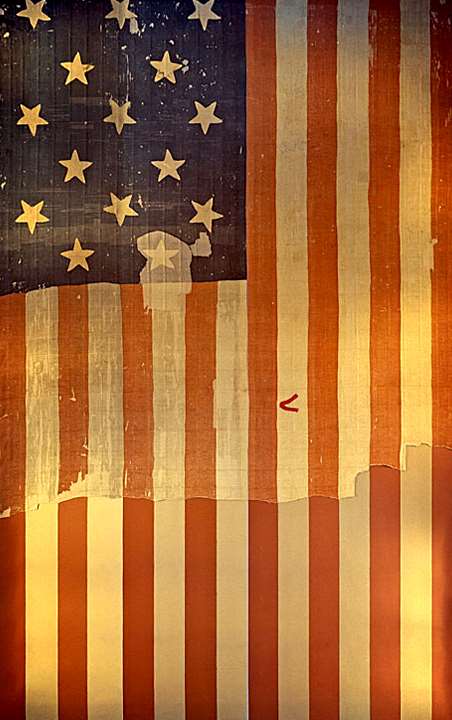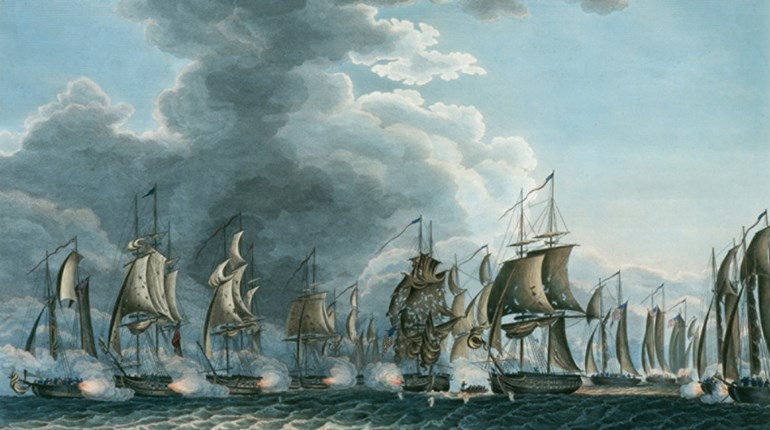

In the tapestry of history that is our Republic, we’re in another of those strangely common weeks: Threads small and large, in colors subtle and radiant, we find knotted into a story that you couldn’t make up. It is stranger still considering how much the national anthem has been in the news of late, and particularly when the poem on which it is based was penned 202 years ago this very week.
The War of 1812 had beginnings coherent to its time. British disagreements with a young United States consisted mainly of machinations to protect her own remaining colonies (Canada and possessions in the West Indies), prevent American trade with Napoleonic France, and to continue the impressment of U.S. citizens into service on chronically undermanned Royal Navy vessels. Relatively speaking, though, these were a sideshow: The United Kingdom’s commitments in a continental-scale war against France made North American actions primarily defensive. But when losses in the Russian and Peninsular Campaigns (the latter at the hands of Field Marshall Arthur Wellesley, the eventual “Iron Duke” of Wellington), and the capture of Paris in March 1814 led to Napoleon’s abdication in April, the still pre-eminent forces of George III brought their considerable powers to bear on the other side of the Atlantic.
In 1814, Francis Scott Key was a 35-year-old Maryland lawyer, and how he came to observe the events that fostered his famous verses—there are actually four, though few know any but the first—is a tale in itself. Many likely recall that his inspiration was the heroic defense of Ft. McHenry over the night of Sep. 13-14—sometimes called the Battle of Baltimore. That his vantage point for the bombardment of the fort may have been a British warship (possibly the 74-gun HMS Minden, but great uncertainty about the vessel remains to this day) is a different matter.That his vantage point for the bombardment of the fort may have been a British warship (possibly the 74-gun HMS Minden, but great uncertainty about the vessel remains to this day) is a different matter.
In fact, Key and Colonel John Skinner had been aboard various Royal Navy ships for the best part of the preceding week. The two were on a mission at the direct behest of fourth U.S. President James Madison to seek the release of Dr. William Beanes.
The doctor had been captured and imprisoned on the orders of British General Robert Ross in the wake of the Battle of Bladensburg. This decisive British victory was a precursor to the capture and burning of Washington (including the White House, U.S. Capital and most other government building on Aug. 24—a reprisal for American burning of York in 1813, though that itself was a reprisal), but saw British troops run riot in the surrounding countryside. Beanes’ role in the round-up and imprisonment of British looters nevertheless put him out of favor with British commanders, despite both Gen. Ross and his naval counterparts having been previously hosted in Beanes’ residence in accordance with the courtesies of the day.
Skinner and Key finally tipped the balance by presenting letters from British soldiers regarding their fine treatment at the hands of Dr. Beanes in the wake of Bladensburg to Gen. Ross and Admiral Alexander Cochrane. By the time the negotiations were complete, however, Key and Skinner had also been exposed to Ross and Cochrane’s plans to shell Fort McHenry as a prelude to attacking Baltimore on the night of Sept. 13. On an envelope he had in his pocket, Key recorded the story most of us remember so well:
O! say can you see, by the dawn's early light,
What so proudly we hailed at the twilight's last gleaming,
Whose broad stripes and bright stars through the perilous fight,
O'er the ramparts we watched, were so gallantly streaming?
And the rockets' red glare, the bombs bursting in air,
Gave proof through the night that our flag was still there;
O! say does that star-spangled banner yet wave
O'er the land of the free and the home of the brave?

Skinner, Dr. Beanes and Key were released at Baltimore on the evening of Sept. 16, and that crucial port—far more valuable in those early days than smoldering Washington—remained in American hands, and the tide had turned against the British. Three and a half months later, the Treaty of Ghent would end the War of 1812. (In a grim commentary of the long, slow communication lines of the era, the Battle of New Orleans—a decisive American victory with terrible British losses—came weeks after the treaty was signed.)
But as we look at our posited 19th century version of a “forgotten” war, the War of 1812/Star Spangled Banner story is incomplete if we stop here.Two sharpshooters—aged 18 and 19—had cost the British the daring, decorated, charismatic General Ross and demoralized his force of 4,000 regular troops.
First, the war was hardly “forgotten” at the time. Modern folk tend to forget it, falling as it does between the miracle of the Revolution and the wrenching moral backdrop and terrible human cost of the Civil War. One combatant—Andrew Jackson—was propelled to the White House largely on the strength of his exploits at the Battle of New Orleans, and our young nation shrugged off the last remnants of any “adolescence” in what was popularly viewed as a second defeat, however narrow, of the world’s pre-eminent military power.
Second, and in what is likely to prove a pivotal election for the future of the Second Amendment, a certain type of “historian” would like for Americans not to recollect that while the admirals famously rained Congreve rockets and between 1,500 and 1,800 cannonballs down in their 27-hour bombardment of Ft. McHenry, Gen. Ross and Royal Marine commander Admiral George Cockburn were far from idle. Their land attack on Baltimore (the Battle of North Point) was a tactical success, but a costly strategic failure, and not for the last time would American liberty survive in the shade of riflemen. Two sharpshooters—aged 18 and 19—had cost the British the daring, decorated, charismatic General Ross and demoralized his force of 4,000 regular troops. Instead, a smaller force of Maryland militiamen fought a delaying action that allowed some 15,000 regular, militia and civilian troops to rally on the very outskirts of Baltimore and turn the invaders.
A final twist in the weave is Key himself. There is no indication he intended his recollection as a lyric (the poem was in fact originally titled “Defense of Fort M’Henry”), and only later was it set to music—paradoxically to what some histories label a British drinking song. Unlike today, however, that sort of “hit” did not produce notable wealth, though it became popular with his countrymen during his lifetime. Only in 1931 did it actually become the National Anthem.
Key continued to make his living in the practice of the law. That practice is perplexing in retrospect, especially in light of current protests of the National Anthem. Key himself was quixotic on the topic of slavery: While opposed to abolition, he practiced “manumission” (the freeing of slaves he owned, at least one of whom continued to work for him for pay), supported the repatriation of African Americans, and publicly criticized the cruelty implicit in slavery. By the end of his life, his about-face was apparently complete, so that an editorial eulogy in the Cincinnati Daily Gazette upon his death in 1843 said: “So actively hostile was he to the peculiar institution that he was called ‘The N_ _ _ _ _ Lawyer” … because he so often volunteered to defend the downtrodden sons and daughters of Africa. Mr. Key convinced me that slavery was wrong—radically wrong.”

































